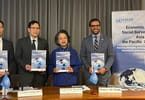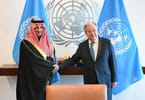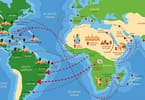Transcript of the Speech delivered by Hon. Edmund Bartlett at the Africa Tourism Recovery Summit in Kenya yesterday:
As is the case for most other developing regions across the world, travel and tourism have become one of the key drivers of growth across the African continent, especially within the last ten years.
In 2018, tourist arrivals among African destinations grew by 5.6 %, which was the second-fastest growth rate among all regions and stronger than the global average growth of 3.9 %.
Ten-year receipts for the continent show that tourist arrivals, in fact, increased from 26 million in 2000 to an estimated 70 million in 2019.
The contribution of tourism to African GDP was measured at USD 168 billion in 2019, equivalent to 7.1 % of total GDP. Tourism also generated close to 25 million jobs while visitor expenditures generated USD61.3BN or 10.4% of total exports.
Unfortunately, even against the backdrop of this strong performance among African destinations in recent years, the tourism industry in Africa remains very fragile, simultaneously exemplifying resilience and vulnerability; with both manifesting at regular intervals and with equal intensity.
Despite being the second most populous continent, Africa received only 5 % of the 1.1 billion people who traveled to global destinations in 2019.
To put this into perspective, the Caribbean, which is a sub-region of 43 million people, received 2.8 % of the international tourists in 2019, almost equal to Africa’s share.
Africa’s relatively small share of the global tourism market is even more disappointing against the backdrop that the continent is endowed with many natural assets that can enhance its tourism competitiveness including abundant natural resources, wildlife and marine life, cultural diversity and extensive natural attractions.
The continent thus has great potential to develop segments that are growing in demand by international travelers such as nature/adventure tourism, cultural heritage tourism, and travel for wellness, health, and retirement purposes.
We can, however, conclude from the available evidence that the African continent has significant untapped tourism potential.
Before African destinations are, however, able to maximize their full growth potential, they will first have to confront some of the major constraints. Africa’s ecological and geological characteristics as well as its geographical location, have been identified as major factors contributing to the volatility of continental tourism.
Many African destinations have traditionally, and more intensely since the emergence of the climate change phenomenon, experienced exaggerated risks associated with droughts, earthquakes, floods, cyclones, food insecurity, biodiversity loss, population displacement, and disease outbreaks.
Even as countries across the continent are currently battling the covid-19 pandemic, many are also simultaneously managing other outbreaks linked to cholera, Ebola, Lassa fever, malaria, measles, polio, and yellow fever.
The current pandemic has produced a devastating impact on Africantourims destinations.
While the case-fatality ratio (CFR) for Covid-19 in Africa remains lower than the global CFR, the continent has traditionally had an underdeveloped and small inter-continental tourism sector with most of its annual visitors arriving from hard-hit regions and countries such as China, US, Great Britain, and Germany.
Ultimately, the combination of national lockdowns, a tiny local tourism customer base, and an industry aimed at big-spending foreign visitors means that Africa’s tourism industry has limited capacity to adapt to the prolonged downturn in international travel.
Africa recorded a 75 % decline in tourist arrivals in 2020 and an estimated USD 120 billion in GDP contributions from tourism in 2020.
This translates to over five times the loss in receipts recorded in 2009 during the global economic and financial crisis. This also translates into the loss of 12.4 million jobs or 51 % fewer jobs in tourism between 2019 and 2020.
Expectedly, many local communities, especially those in the vicinity of wildlife conservation areas and depend on tourism for their economic livelihoods, are now facing risks of starvation and lack of basic humanitarian services due to the steep tourism decline experienced over the past several months.
The current pandemic has only magnified some of the more traditional, structural challenges facing many African destinations. These challenges have weakened their resistance and resilience threshold.
They include Underdeveloped infrastructure, political instability, lack of security, safety, and high crime, the difficulty faced by investors in accessing finance, high taxes on tourism investments, low levels of tourism skill, red tape and bureaucracy and low levels of budgetary support from governments, even in destinations where tourism is a major economic contributor.
It is clear that the task of tourism recovery among African destinations requires a strong tourism resilience framework with elements such as cross-sectoral collaborations, international funding, and technical assistance, the development of comprehensive warning systems, the development of resilience barometers, research and innovation, the development of niche markets human resource development and training, improved marketing tools, greater involvement of African diasporas globally, improving destination attractiveness and security and increased efforts to build resilience and support product development among local communities.
As the focal institution for coordinating strategies and interventions to enhance tourism resilience globally, the Global Tourism Resilience and Crisis Management Centre (GTCMC) stands ready to help put together a recovery coalition for African destinations and to enhance the overall resilience of African destinations.
This coalition might include African tourism ministers, hoteliers and other industry leaders, the private sector, members of the academic community, members of the African diasporas, community groups, native tribes, and representatives of local, regional, and international tourism organizations.
This will build on the work that we have already started through the establishment of one of our satellite centers at Kenyatta University, Kenya in 2019 and another that we have earmarked for Seychelles.
Finally, I also believe that there will be a growing demand for tourism products in the post covid era that will offer Africa a source of competitive advantage. The demand for tourism products including; cultural, heritage, health, and wellness is likely to grow as visitors’ habits increasingly shift from laissez-faire tourism to sustainable tourism.
To this end, African destinations are in partnership with cruise lines and airlines, especially in North America and Europe. can explore the possibility of multi-destination arrangements that will allow tourists, to, for example, to relive the experiences or route of the Middle Passage.
African tourism industry leaders should also aggressively target the African diasporas, especially those in the Americas, to encourage them to consider Africa as a viable, attractive tourism market with the goal being to develop attractive products and packages that can untap the need for nostalgic experiences on the African continent by the diasporic communities in the Americas.
The pandemic has also shown that African destinations can no longer hinge the success of their tourism product on a few traditional markets based in North America and Europe.
They must increasingly find ways to aggressively pursue and tap into new markets. To this end, they can begin to look closer at home. Of course, we are talking about the Middle East- a geographical region that is not only proximal to some African destinations but also holds significant potential.
The UNWTO has described the Middle East as one of the smallest, yet fastest growing, tourist-generating regions in the world, with outbound travel quadrupling in the last 20 years. The outlook for a future of fruitful partnerships between African destinations and the Middle East is certainly positive given the right conditions and factors.
In closing, I will take this opportunity to once again stress the important role that two phenomena will play in the recovery of continental as well as international tourism.
These two phenomena are vaccine inequity and vaccine hesitancy. On the matter of vaccine inequity, we implore the wealthier countries to assume a greater sense of moral responsibility to share vaccine supplies with many poor countries and regions that are lagging behind.
This is critical to helping these countries to achieve herd immunity and to regain the confidence of international travelers to promote full tourism recovery.
On the matter of vaccine hesitancy, I implore all stakeholders in both government and the private sector to develop public education campaigns to allay fears and anxieties and to sensitize all citizens about the importance of vaccination.
It cannot be stressed enough that the recovery of African economies depends almost indispensably on the extent to which as many persons as possible are vaccinated. Vaccine promotion should now be the main goal of public policymakers across the whole African continent.
The Tourism Recovery Summit ended with the signing of the Nairobi Delcaration. It reads:





















